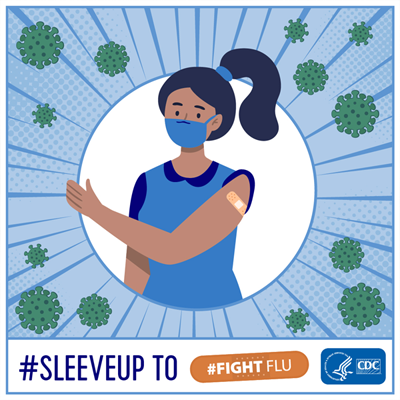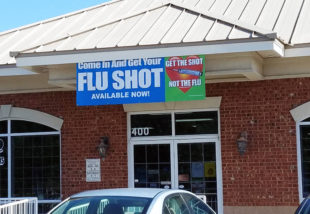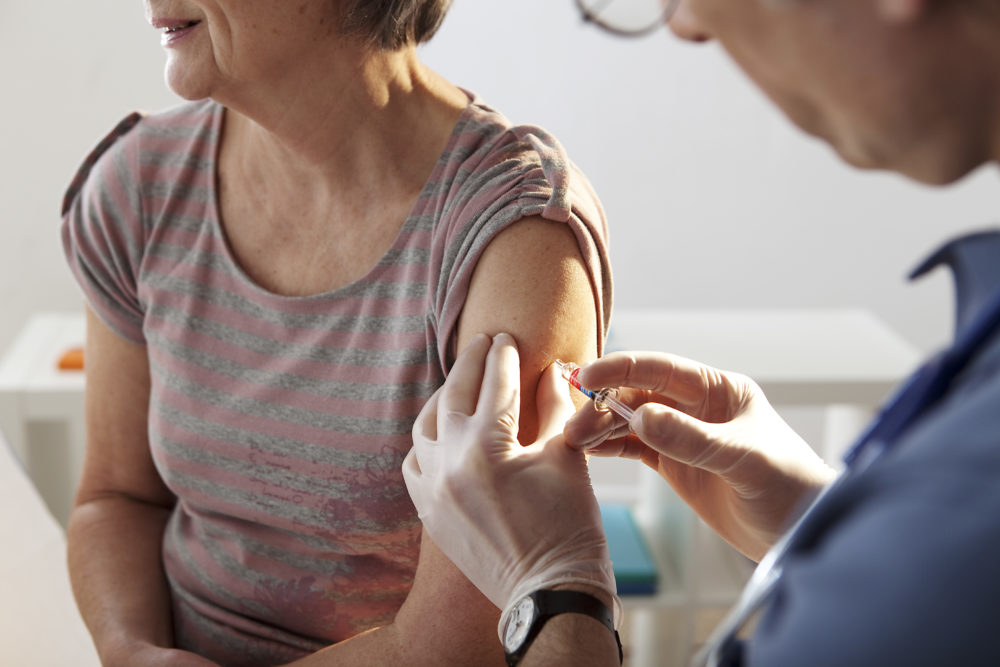By William Newlin
Tara Graham recently emerged from the side entrance of the Athens-Clarke County Courthouse ready to face one of two major public health threats looming this fall.
Graham, a clerk in the county magistrate court, had just received her flu shot from a joint clinic run by the University of Georgia Health Center and the College of Pharmacy. That was nothing unusual for Graham, who was masked as she made the short walk from the court exit to the parking deck. She said she gets her flu vaccine every year.
This flu season, however, the public health climate is different, for her and for everyone. In addition to influenza, we are under threat from a deadly pandemic — COVID-19 — for which no vaccine is yet available in this country.

Getting a flu shot is “the same as wearing masks for COVID,” said Adam Soloway, a UGA pharmacy student and one of the people providing flu shots at the courthouse that October day. “To protect vulnerable populations.”
Georgia’s 2020 seasonal flu vaccination campaign has begun. From Gov. Brian Kemp’s Oct. 7 press conference to local TV ads to pop-up clinics throughout Athens, it’s clear that the state and municipal governments don’t want the flu season to pass under the radar this winter.
Right now, COVID-19 has a rightful place as public health priority No. 1. The coronavirus has claimed more American lives since March than the four flu seasons from 2015 and 2019 combined, according to the CDC. Still, the seasonal flu isn’t something to sneeze at. It can sicken and even kill a lot of people.
“Receiving a flu vaccine is important any year and is especially important this year,” said Sarah Peck, Clarke County health department clinic manager. “The fewer people who are hospitalized with flu, the more medical resources we will have available to treat people who are sick with COVID-19.”
But there’s another pressing reason to get vaccinated this fall – the potential for health care professionals to misdiagnose the flu for COVID-19, and vice versa. Both are respiratory illnesses, with many of the same symptoms.
Dr. Anthony Fauci, director of the National Institute of Allergy and Infectious Disease, told Axios that flu vaccination can help reduce the dangerous effects of an incorrect diagnosis.
Referring to the two diseases, Fauci said, “You can help eliminate at least one of them, or at least mitigate one of them, by vaccination.”
Awareness may be a helpful factor
From Sept. 27 to Oct. 24, the most recent period for which there’s available data from the Georgia Department of Public Health, 4,802 people made health care visits for influenza-like illnesses. From Sept. 29 to Oct. 26, 2019, the number was 8,511, according to DPH records.
While it’s still early in the 2020-21 flu season, those figures suggest that there’s a slightly reduced flu burden on the health system this year. There are multiple factors that could be contributing to that trend. One is that many people are getting the annual vaccine.

Davelle Pursner, a registered nurse working for UGA’s University Health Center, estimated the UHC had delivered about 1,000 doses of vaccine, mostly to students, as of Oct. 7.
“I think last year we had a big increase in our uptake of flu vaccines, especially early in the season, and we’re kind of seeing that continue” Pursner said. “So, I think it’s becoming a bit of the new norm.”
Pursner attributed the trend both to students realizing that they and their friends can become seriously ill from influenza, and to scientifically sound public messaging that has pushed back against misinformation discouraging use of the vaccine.
A survey of 1,000 U.S. adults conducted by the National Foundation for Infectious Diseases found a similar pro-vaccination trend nationwide. According to the survey results, 59 percent of Americans plan to get a flu vaccine, versus 52 percent a year ago.

Also, only 34 percent of respondents expressed concerns that the flu vaccine would not work, compared to 51 percent in 2019.
A newly released Kaiser Family Foundation analysis found that across the United States, rates of people 6 months and older receiving the flu vaccine last season varied widely. Rates ranged from a low of 44 percent in Nevada to a high of 61 percent in Rhode Island. In Georgia, the vaccination rate was among the lowest, at 46 percent.
And the percentages of African-Americans and Latinos getting flu shots last season in Georgia was significantly lower than the rates for whites.
The flu shot uptake may have some challenges. The Atlanta Journal Constitution reported that access to high-dose flu vaccines, meant to create a stronger immune response in older people, is sparse in some parts of Georgia. It’s not a serious problem yet, but heightened demand for vaccines this flu season has created temporary shortages in some areas.
Signs of hope abroad
There’s another new norm that might also limit the severity of the 2020-21 flu season – COVID-19 public health measures.
While some models project a “perfect storm,” in which seasonal flu and COVID-19 combine at the population level, UGA Health Informatics Institute associate department head Andreas Handel says it’s not all doom and gloom.

“It’s still a bad situation, but I think it’s not as bad as the ‘perfect storm’ idea might suggest,” Handel said in mid-September. “And the main reason for that, the main component, is the things we do.”
Non-medical interventions, such as mask wearing and social distancing, help reduce the effects of all respiratory illnesses, not just COVID-19, Handel said. He analyzes flu trend data from countries like Australia, which experienced their flu seasons roughly from April to September and were “strongly suppressed,” he said.
According to the Australian Influenza Surveillance Report, for example, the country saw a nearly 15-fold decrease in total reported influenza cases between its 2019 and 2020 flu seasons with 21,119 total cases and 36 influenza-associated deaths.
Handel said this sharp reduction wasn’t due to less reporting, but that Australia’s public health interventions created to halt the spread of COVID-19 helped beat back the flu as well.
“I think assuming that we will be able to keep up the non-pharmaceutical interventions that we have in place right now, this will have a strong effect on flu,” Handel said in the talk. “And I predict this flu season will be mild.”
Despite Handel’s projection, health care workers still highly recommend getting a flu shot.
“Sometimes people don’t learn this lesson until they’ve had the flu,” said Pursner, the nurse at UGA. “But anything you can do to prevent it can prevent a lot of pain later.”

William Newlin is a fourth-year journalism and international affairs student at the University of Georgia. He serves as Assistant Sports Editor for The Red & Black, the independent student-run newspaper in Athens, where he specializes in stories about football and baseball. Twitter: @w_newlin

